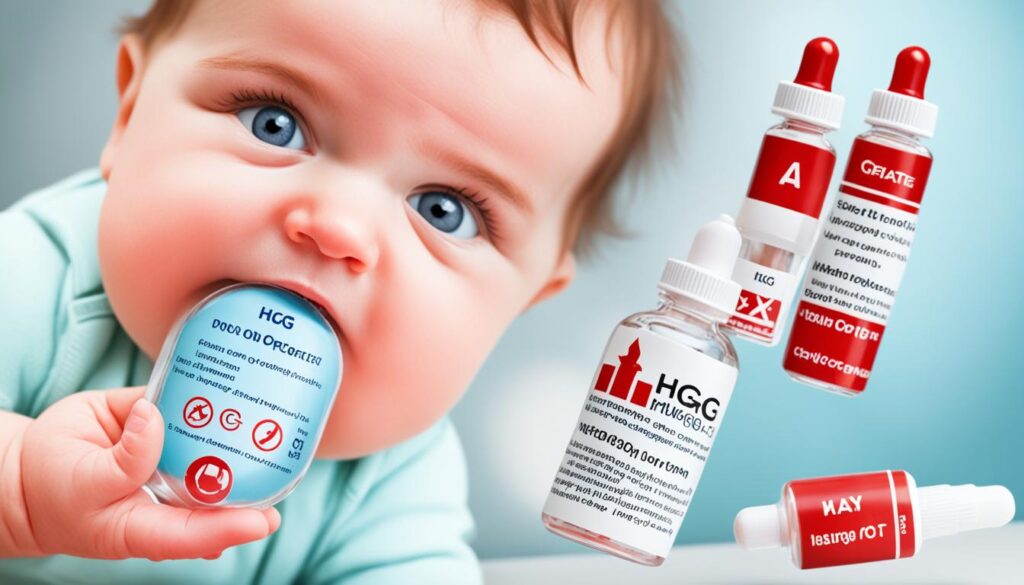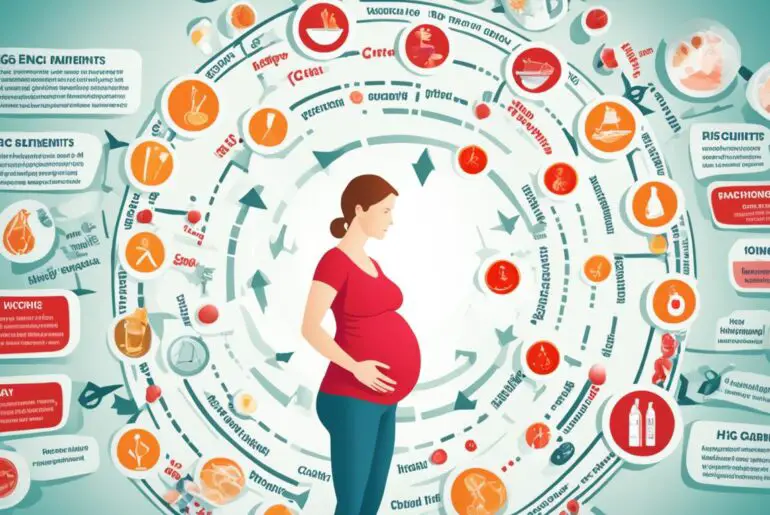Did you know that over-the-counter HCG drops, which are often used for weight loss, have not been approved by the FDA and may pose risks to pregnant women?
Many people turn to HCG drops, which contain the hormone human chorionic gonadotropin (HCG), in an attempt to shed pounds. However, the safety of these products, especially for pregnant women, is questionable.
In this article, I will explore the potential risks associated with HCG drops and why pregnant women should avoid using them. We’ll delve into the FDA’s warning, the dangers of severe calorie restriction, and the lack of scientific evidence supporting the use of HCG drops for weight loss during pregnancy.
Key Takeaways:
- Over-the-counter HCG drops are not approved by the FDA and may be unsafe for pregnant women.
- The HCG diet, which involves severe calorie restriction along with HCG drops, lacks scientific evidence and can lead to various health risks.
- Pregnant women should avoid using HCG drops due to potential impacts on fetal development and the risk of blood clots.
- There are safer alternatives for weight management during pregnancy, such as adopting a balanced diet and engaging in approved physical activity.
- Consulting with a healthcare provider is crucial to ensure the safety and well-being of both the mother and the developing baby.
The HCG Diet and FDA Warning
In recent years, the HCG diet has gained popularity as a weight-loss method. Advocates claim that combining severe calorie restriction with HCG drops can lead to rapid weight loss. However, the FDA has issued a warning against using HCG weight-loss products, including drops, as they are not approved for weight loss and may be dangerous.
The HCG diet involves consuming a very low-calorie diet, usually around 500 calories per day, while also taking HCG drops. While the idea of losing weight quickly may be appealing, it’s important to consider the potential risks and lack of scientific evidence supporting the effectiveness of this diet.
“The FDA advises consumers to avoid over-the-counter HCG weight-loss products as they may be unsafe.”
Pregnant women should be particularly cautious when considering the use of HCG drops. The risks of using HCG drops during pregnancy are not well understood, and there is a lack of safety data to support their use in this population.
It is crucial for expectant mothers to prioritize their health and the well-being of their unborn child. The potential risks associated with HCG drops during pregnancy include possible complications and uncertainties about the impact on fetal development. Therefore, it is recommended that pregnant women avoid using HCG drops.
| Risks of Using HCG Drops during Pregnancy | HCG Diet Safety Concerns |
|---|---|
| The impact on fetal development is not well understood and may pose risks. | The HCG diet involves severe calorie restriction, which can lead to various health risks. |
| There is a lack of safety data on the use of HCG drops during pregnancy. | The effectiveness of the HCG diet lacks scientific evidence. |
| Pregnant women should prioritize their health and the well-being of their unborn child. | Consultation with healthcare providers is necessary for safe weight management during pregnancy. |
Potential Risks of HCG Drops for Pregnant Women

Using HCG drops during pregnancy can pose various risks to both the mother and the developing fetus. Potential side effects reported with HCG drops include fatigue, irritability, restlessness, depression, fluid buildup, and swelling of the breasts in males. There is also a concern about blood clot formation and blockage of blood vessels (thromboembolism). The use of HCG drops during pregnancy may interfere with normal hormone levels and fetal development, potentially leading to adverse outcomes.
Pregnant women should consult with their healthcare provider before using any weight loss products, including HCG drops.
These potential risks should be taken seriously, as they can have a significant impact on the health and well-being of both the mother and the developing baby.
Safe Alternatives to HCG Drops for Pregnant Women
If you are pregnant and looking to manage your weight or maintain a healthy lifestyle, it is important to be aware of safe alternatives to HCG drops. While HCG drops are not recommended for use during pregnancy due to potential risks, there are other options that can support your wellness journey without compromising your health or the health of your baby.
One of the key alternatives is adopting a balanced diet that meets the nutritional needs of both you and your baby. Opt for a variety of nutrient-rich foods, including fruits, vegetables, whole grains, lean proteins, and healthy fats. Consult with a qualified healthcare professional or registered dietitian who can provide personalized guidance on your dietary needs during pregnancy.
In addition to a balanced diet, engaging in regular physical activity that is approved by your healthcare provider can promote both physical and mental well-being. Safe exercises for pregnant women include brisk walking, swimming, prenatal yoga, and low-impact aerobics. Regular physical activity can help manage weight gain, promote healthy circulation, and reduce discomfort during pregnancy.
When considering any weight loss methods or dietary supplements, it is crucial to make informed decisions and seek guidance from healthcare professionals. They can provide you with evidence-based recommendations and help you navigate the options that align with your goals and overall health during pregnancy.
Remember, your priority during pregnancy should be the health and well-being of both you and your baby. By choosing safe alternatives to HCG drops, you can support a healthy lifestyle and make choices that contribute to a positive pregnancy experience.
| Safe Alternatives to HCG Drops for Pregnant Women | |
|---|---|
| 1. Adopt a balanced diet: Include a variety of nutrient-rich foods, consult with a healthcare professional or dietitian for personalized guidance. 2. Engage in approved physical activity: 3. Seek guidance from healthcare professionals: |
Understanding the HCG Hormone and its Role in Pregnancy
The HCG hormone, or human chorionic gonadotropin, plays a vital role in pregnancy. It is produced in large amounts during pregnancy and serves to support the healthy growth of the uterus and fetus. One of its essential functions is to maintain the production of other crucial hormones, such as progesterone, which is necessary for maintaining a healthy pregnancy.
During the early stages of pregnancy, HCG levels rise rapidly, reaching their peak around the twelfth week. After this period, the levels begin to decline but remain present throughout pregnancy.
While HCG is a natural hormone essential for the development of a healthy pregnancy, caution should be exercised when considering the use of HCG drops during pregnancy. There is a lack of safety data regarding the use of HCG drops during this critical time, and potential risks are not fully understood.
It is important for pregnant women to prioritize their health and the well-being of their babies, and to consult with healthcare professionals who can provide guidance on safe and appropriate weight management strategies during pregnancy.
Health Risks of Very Low-Calorie Diets

Very low-calorie diets, such as those recommended in the HCG diet, can pose significant health risks. These diets are associated with a range of potential complications and health concerns, including:
- Gallstone formation
- Electrolyte imbalances
- Irregular heartbeat
- Muscle loss
- Nutrient deficiencies
Severe calorie restriction can also lead to increased hunger, irritability, and fatigue. It is important to understand that pregnant women should be especially cautious when considering very low-calorie diets, as they have increased nutrient needs during pregnancy, and severe calorie restriction can harm both the mother and the developing baby.
It is always recommended to consult with a healthcare professional before embarking on any restrictive diet, especially during pregnancy. They can provide personalized guidance and help ensure that the diet supports the health and well-being of both the mother and the baby.
“Very low-calorie diets can result in significant risks to overall health due to the limited intake of essential nutrients.”
Safer Ways to Manage Weight During Pregnancy

Pregnancy is a critical period where a woman’s body undergoes significant changes to support the growth and development of the baby. Rather than focusing on weight loss goals during this time, it is important for pregnant women to prioritize maintaining a healthy lifestyle. By adopting safer alternatives for weight management during pregnancy, women can ensure their well-being and promote the optimal development of their baby.
Eating a balanced diet that provides essential nutrients is crucial for both the mother and the baby. By focusing on nutrient-dense foods such as fruits, vegetables, whole grains, lean proteins, and healthy fats, pregnant women can meet their nutritional needs. Consulting with a healthcare professional or a registered dietitian can provide personalized recommendations based on individual health status and dietary preferences.
Engaging in regular physical activity that is safe and appropriate for pregnancy is also beneficial. Low-impact exercises such as walking, swimming, and prenatal yoga can help improve overall fitness levels, promote circulation, and relieve common pregnancy discomforts. However, it is important to consult with a healthcare provider before starting any exercise program during pregnancy to ensure safety.
Seeking guidance from healthcare professionals is crucial for pregnant women. Healthcare providers can offer personalized recommendations and monitor the health of both the mother and the baby. Regular prenatal visits are essential for tracking weight gain, checking for any complications, and addressing any concerns or questions that may arise.
| Safe Alternatives for Weight Management During Pregnancy | Benefits |
|---|---|
| 1. Balanced Diet | – Provides essential nutrients for the mother and the baby – Supports healthy development – Promotes optimal nutrition |
| 2. Regular Physical Activity | – Improves overall fitness levels – Promotes circulation – Relieves common pregnancy discomforts |
| 3. Healthcare Professional Guidance | – Provides personalized recommendations – Monitors the health of both the mother and the baby – Addresses concerns and questions |
It is crucial for pregnant women to prioritize the health and well-being of both themselves and their developing baby. By adopting safer alternatives for weight management during pregnancy and maintaining a healthy lifestyle, women can support their own health and promote the optimal development of their baby. Remember to consult with healthcare professionals for personalized guidance and recommendations.
Importance of Consultation with Healthcare Provider

Pregnant women should always consult with their healthcare provider before using any weight loss products, including HCG drops. Healthcare professionals can provide guidance on safe and appropriate weight management strategies during pregnancy, taking into account individual health status and potential risks. They can also help pregnant women understand the potential risks associated with the use of HCG drops and provide evidence-based recommendations for maintaining a healthy pregnancy.
During pregnancy, it is crucial to prioritize the well-being of both the mother and the developing baby. Seeking professional advice from a healthcare provider ensures that the weight loss methods chosen are safe and suitable for pregnancy.
Consulting a healthcare provider is especially important because pregnancy introduces unique considerations, such as changes in hormonal balance, increased nutrient requirements, and potential risks to fetal development. By collaborating with healthcare professionals, pregnant women can receive personalized advice based on their specific health needs and concerns.
Healthcare providers can offer safety guidelines for pregnant women using HCG drops, helping them make informed decisions about weight management during pregnancy. They can explain the potential risks associated with the use of HCG drops, such as interference with hormonal levels and potential impacts on fetal development.
“It is vital for pregnant women to consult with their healthcare provider before embarking on any weight loss journey. The expertise and guidance of healthcare professionals can ensure that pregnant women maintain a healthy pregnancy and reduce any potential risks.” – Dr. Emma Thompson, OB-GYN Specialist
By consulting a healthcare provider, pregnant women can also explore safer alternatives to HCG drops for weight management during pregnancy. These alternatives may include adopting a balanced diet that meets the nutritional needs of both the mother and the baby, engaging in regular physical activity recommended by the healthcare provider, and seeking support from a registered dietitian or nutritionist.
Guidelines for Using HCG Drops Safely During Pregnancy
If a healthcare provider determines that using HCG drops is necessary during pregnancy, it is essential to follow specific safety guidelines:
- Only use HCG drops under the supervision and guidance of a healthcare provider who has experience with pregnant patients.
- Adhere strictly to the recommended dosage and duration of use provided by the healthcare provider.
- Monitor for any adverse effects or changes in health during the use of HCG drops and immediately report them to the healthcare provider.
- Continue regular check-ups and prenatal care appointments to ensure the health and well-being of both the mother and the baby.
It is important to note that HCG drops are not approved for over-the-counter use and should only be used under the supervision of a healthcare provider during pregnancy, if necessary.
| Safety Guidelines for Pregnant Women Using HCG Drops |
|---|
| 1. Consult with a healthcare provider before using HCG drops during pregnancy. |
| 2. Follow the recommended dosage and duration of use provided by the healthcare provider. |
| 3. Monitor for any adverse effects and report them to the healthcare provider immediately. |
| 4. Continue regular prenatal care appointments for comprehensive health monitoring. |
Remember, every pregnancy is unique, and what may be suitable for one woman may not be appropriate for another. Consulting a healthcare provider is the best way to ensure the safety and well-being of both the mother and the baby during pregnancy.
Lack of Evidence for Effectiveness of HCG Drops for Weight Loss
Despite the growing popularity of the HCG diet and the use of HCG drops for weight loss, there is a lack of scientific evidence to support their effectiveness. Numerous studies have compared the effects of HCG drops to a placebo or a calorie-restricted diet, and the results consistently show no significant difference in weight loss outcomes.
Weight loss is a complex process influenced by various factors, including caloric intake, exercise, and metabolism. While some proponents of HCG drops claim that they enhance weight loss by boosting metabolism and reducing hunger, there is currently no scientific evidence to back up these claims.
One study published in the Journal of the American Medical Association concluded that the HCG diet is no more effective than a calorie-restricted diet alone when it comes to weight loss. The study, which involved a randomized controlled trial with 51 overweight individuals, found that both groups lost significant weight, but there was no significant difference between those who used HCG drops and those who followed the calorie-restricted diet without HCG.
HCG drops are often promoted as a quick and easy way to shed pounds, but the scientific evidence simply does not support these claims. It is important to rely on evidence-based approaches for weight management and consult with healthcare professionals for personalized recommendations.
Weight loss should be approached with caution, especially during pregnancy, as it can affect both the mother and the developing fetus. Pregnant women should prioritize their health and consult with their healthcare provider before considering any weight loss methods, including the use of HCG drops.
While further research is needed to provide a definitive conclusion, the current lack of scientific evidence for the effectiveness of HCG drops for weight loss highlights the importance of making informed decisions based on reliable information and professional advice.
Conclusion
Based on the available information and research, it is evident that the use of HCG drops during pregnancy poses potential risks and safety concerns. Therefore, it is strongly advised for pregnant women to avoid using HCG drops as a weight management solution. Prioritizing the health and well-being of both the mother and the developing baby is crucial during this critical period.
Consulting with a healthcare provider is essential for pregnant women to receive personalized guidance and safe weight management strategies. Healthcare professionals can provide evidence-based recommendations and help individuals understand the potential risks associated with the use of HCG drops.
Severe calorie restriction, as recommended by the HCG diet, and the use of unapproved weight loss products can have adverse effects on the health of pregnant women, including the risk of vitamin and mineral deficiencies, electrolyte imbalances, and other complications. It is important for pregnant women to make informed decisions, prioritize a healthy lifestyle, and seek professional guidance to ensure the well-being of themselves and their babies.
FAQ
Are HCG drops safe for pregnant women?
No, HCG drops are not safe for pregnant women. The use of HCG drops during pregnancy can pose various risks to both the mother and the developing fetus. It is important for pregnant women to consult with their healthcare provider before using any weight loss products, including HCG drops.
What are the potential side effects of using HCG drops during pregnancy?
Potential side effects of using HCG drops during pregnancy include fatigue, irritability, restlessness, depression, fluid buildup, swelling of the breasts in males, and a concern for blood clot formation and blockage of blood vessels (thromboembolism).
What are safe alternatives to HCG drops for pregnant women?
Pregnant women can consider adopting a balanced diet that meets the nutritional needs of both the mother and the baby, engaging in regular physical activity that is approved by a healthcare provider, and seeking guidance from a qualified healthcare professional or registered dietitian.
What is the role of the HCG hormone in pregnancy?
The HCG hormone, or human chorionic gonadotropin, is produced in large amounts during pregnancy to support the healthy growth of the uterus and fetus. Its primary role is to maintain the production of essential hormones, such as progesterone.
What are the health risks of very low-calorie diets?
Very low-calorie diets, such as those recommended in the HCG diet, can pose significant health risks. These include gallstone formation, electrolyte imbalances, irregular heartbeat, muscle loss, and nutrient deficiencies. Severe calorie restriction can also lead to increased hunger, irritability, and fatigue.
How can pregnant women manage their weight safely?
Pregnant women should focus on maintaining a healthy lifestyle that includes eating a balanced diet, engaging in regular physical activity approved by a healthcare provider, and seeking guidance from healthcare professionals for personalized recommendations on weight management during pregnancy.
Why is consulting with a healthcare provider important during pregnancy?
Pregnant women should always consult with their healthcare provider before using any weight loss products, including HCG drops. Healthcare professionals can provide guidance on safe and appropriate weight management strategies during pregnancy, taking into account individual health status and potential risks.
Is there scientific evidence for the effectiveness of HCG drops for weight loss?
No, there is a lack of scientific evidence to support the effectiveness of HCG drops for weight loss. Studies comparing the effects of HCG drops to a placebo or calorie-restricted diet have found no significant difference in weight loss outcomes.




